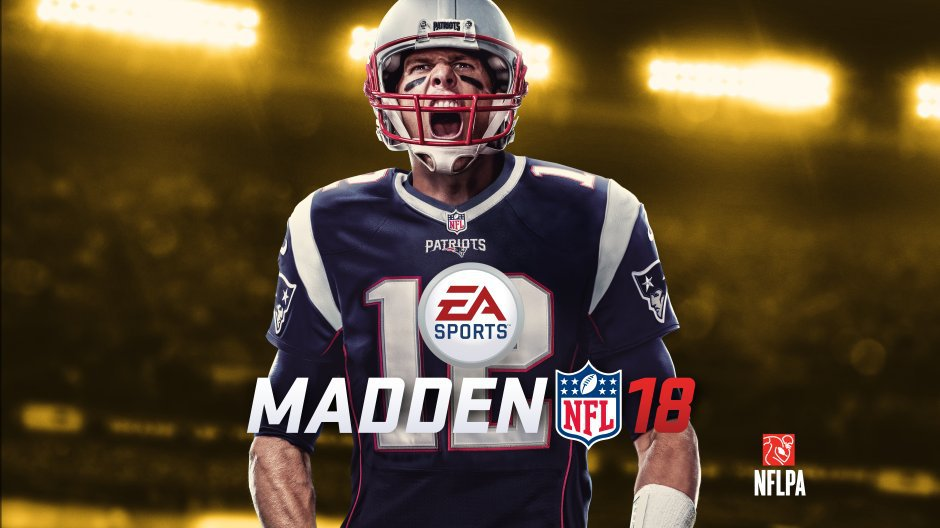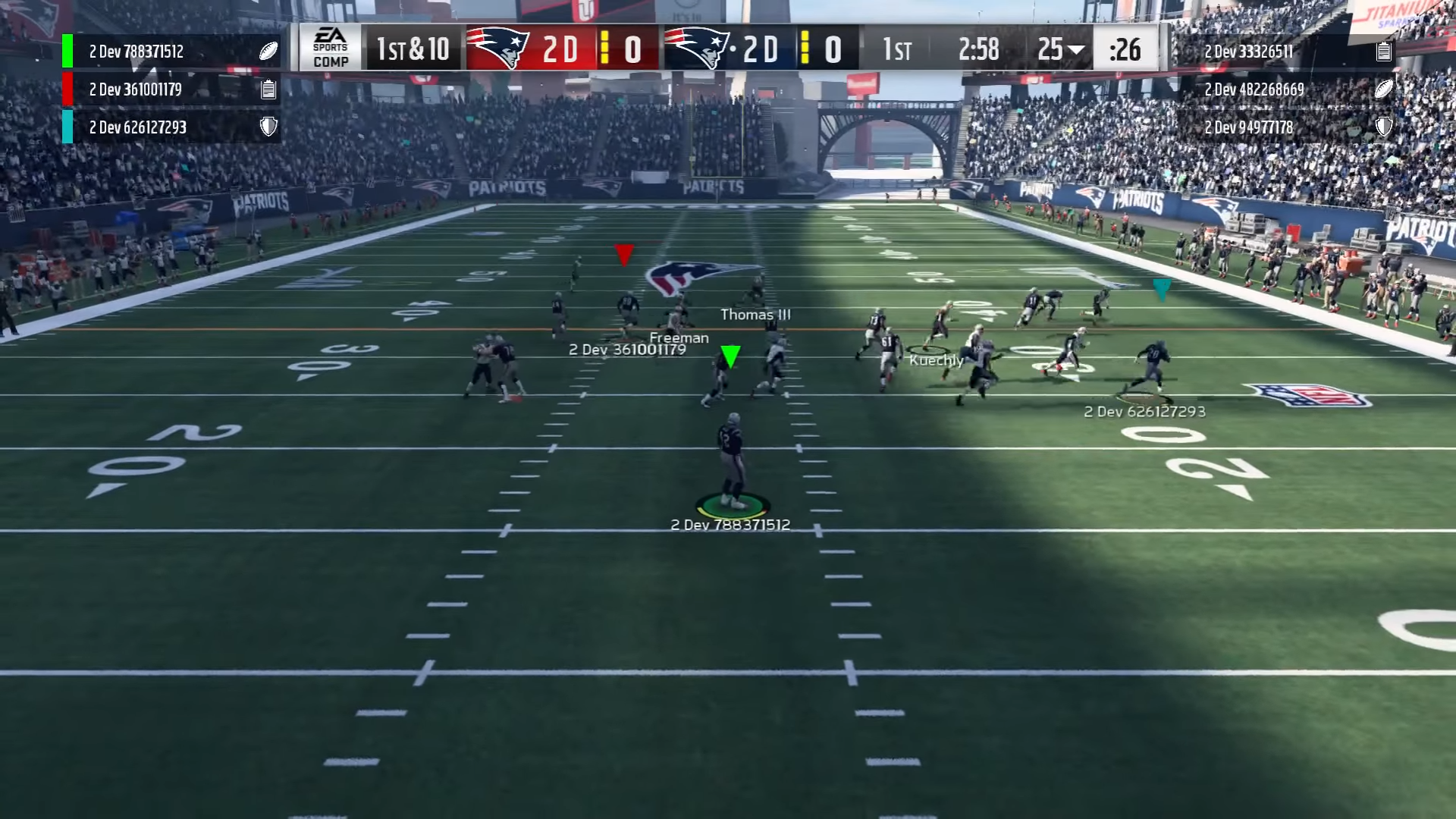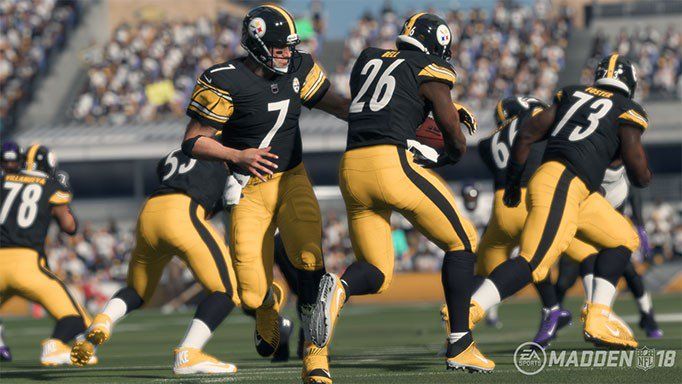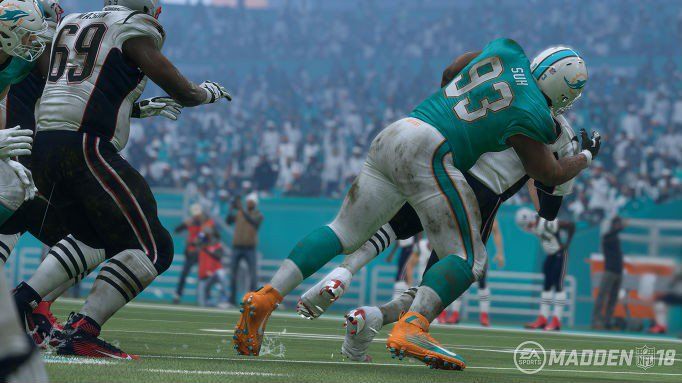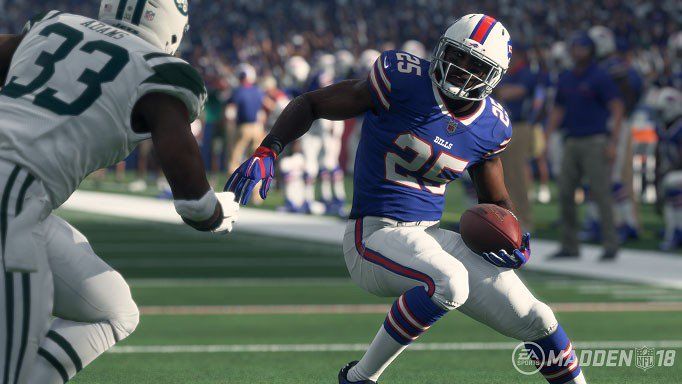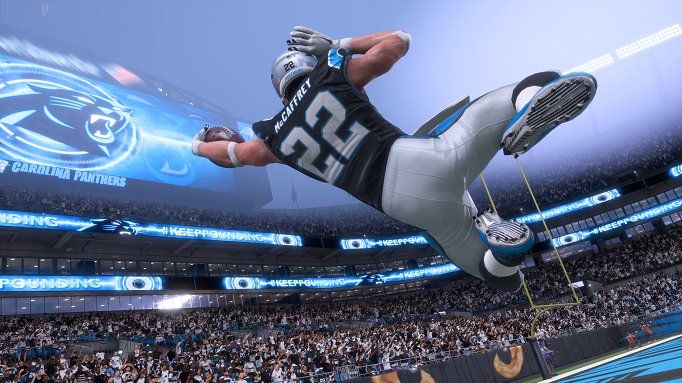Madden NFL 18 releases later this month, and in addition to running on the Frostbite engine, it brings a couple new modes to the series. One is called Longshot, and covers the the story of Devon Wade, a former college star who dropped football, but gets the chance to make his way back into the NFL. Another new mode comes in Madden Ultimate Team with MUT Squads.
In MUT Squads, three players can partner with their respective Ultimate Team decks and craft their own football team. In games, all three players can take full control of a player, choose and run plays and more in three minute quarters. This mode keeps the action fast paced and engaging, and is a ton of fun when playing with people you know.
At a recent EA Sports event, I had the chance to play MUT Squads in Madden NFL 18, and had a blast choosing and executing plays with others. I also got the chance to sit down with Patrick Bellanca, Lead Designer of MUT Squads, and discuss this new mode.
Tomas Franzese: What inspired EA Tiburon to bring Madden Ultimate Team (MUT) Squads to Madden NFL 18?
Patrick Bellanca: As a fan of team experiences, any sort of gameplay experience like Rocket League, Overwatch, PUBG, Destiny, The Division, Wildlands, I play them to play with my friends. I've been on Ultimate Team the past few years; I've become a fan, it's where I play the most Madden now. It was easy for me, I'm sure the business had its own motivations, but for me as a designer, it is what I've been wanting to build.
Ultimate Team is already our most competitive place to play Madden, and team-based games are the most competitive games when you look at what is driving eSports right now, so it seemed like a perfect marriage. As I pitched it and got warm reception from the people responsible for saying yes or no, but also just as much from the fans, it became obvious that that is what we were missing. Ultimate Team is really fun in its own right, and it's a place where people bring other people in and share these experiences, and share these cards that they rip and all that. We needed a team version of that. We just needed some way that we cooperatively could play with your MUT cards.
[pullquote]Ultimate Team is already our most competitive place to play Madden, and team based games are the most competitive games when you look at what is driving eSports right now, so it seemed like a perfect marriage. [/pullquote]
TF: How did you determine the length of MUT Squads games?
PB: It was a trial and error thing. I worked backwards from how many games I wanted you to be able to play in a night, as if you were that guy that was motivated to meet up with your friends after work and play as many games as you could before you go to bed. We just did some math, and wanted games to not take as long as a 1v1 game, and didn't want it to be so short that one team didn't get enough possessions. I was looking for that perfect balance of I got just enough possession of the ball, but the game didn't go on and on and on.
A couple of things you'll notice in our game, and any online mode: when you press start, it will pause the game for you and your opponent, and you both have to press resume to get back into the game. Not in this mode: it was paramount that we didn't interrupt the player's experience. If one player could pause, and all six players then had to un-pause to resume the game, you could just imagine how much time potentially could be tacked on to the game experience.
I wanted the whole thing to be wrapped in thirty to 35 minutes, and so the fact that you can't pause the game and pause it for everybody, and the fact that the quarter length is tuned just right, and that we made decisions about how long the play clock would be, ultimately to get to the end goal of a game that lasted thirty to 35 minutes.
TF: Could you describe the different roles players can take in MUT Squads?
PB: There are three distinct roles: the Offense Captain, the Defense Captain, and the Head Coach. Each of these roles has two main factors - what you contribute to building the team's lineup, and what you do once you get into a game.
The Offense Captain is responsible for contributing all of the players that you would find in your MUT offense, so in your MUT lineup on the offense page, all of your offensive positions, and all of the positions of depth, the Offense Captain brings all of that to the game, as well as their offensive playbook. The Defense Captain brings all the defense players on the whole page, as well their playbook. The Head Coach brings the stadium, the uniform, and the Head Coach card, which will have value in the chemistry that are on those cards.
Once in game, the Offense Captain is in control of the offense, so they start with calling the play, they then perform pre-snap adjustments, and they control the quarterback. They then have two teammates on the field to work with. On the defensive side, the Defense Captain has play calling responsibilities, and pre-play adjustments, and again has two teammates that he can coach into doing what he needs them to do.
[pullquote]Each of these roles has two main factors - what you contribute to building the team's lineup, and what you do once you get into a game.[/pullquote]
The Head Coach is a teammate that can be instructed on any given plays that the Captains need him to do. Additionally, in the event of a penalty, he decides the result, and if there is a challenge scenario, he decides that too. There was a reason we did that. We wanted to provide players with an opportunity to bring a friend in without the requirement that they had been investing in MUT the same as you.
If you and I play a lot of MUT, and we have MUT lineups with good players, and we've got elites, and we're invested in spending time and playing in solo challenges and whatnot, we could bring a friend in to Ultimate Team, maybe a friend that only plays franchise. We could share this experience without them having the need to rip a bunch of packs so there is no guilt of "oh, my cards aren't very good, so I'm not going to have a good time."
We wanted there to be one of the three roles that services as an on-boarding location. I can bring a friend in, I can teach them about the game of Madden, we can win as a team, and we can contribute our success to the fact that we are cooperating in some organized manner. We iterated through it, and we ended up with two roles that, with regard to contribution, are imbalanced, you do the most for offense and defense. But the reason was that we wanted there to be a position for the player that doesn't play a lot of MUT, but wants to play with his friends.
TF: Does MUT Squads support local co-op? If not, is it a feature you would consider adding?
PB: It does not support like "on the same console" co-op. Everyone has to have their own MUT Team, have their own version of Madden and console. It is something that I would like to do, but we don't have it for launch.
TF: What influenced your decision to allow players to move freely and not directly stick to their routes?
PB: It was more fun that way. It matches user expectation. Something I learned as a designer is that even if you have an idea, and you think you're idea is good, and even if other people think your idea is good, if an end-user's expectations aren't met, they will say that, and that has a negative spin to it often, just in the way people communicate. It's really important to be transparent, and to playtest, and to solicit feedback.
[pullquote]EA has a program called the Game Changers, where select members of the community get to come to our building a few times a year and play the game in various stages throughout development, and give real-time feedback. [/pullquote]
TF: How much community feedback was taken while developing Madden NFL 18?
PB: Quite a bit. I'm thankful that EA has given us that opportunity. I'm on Twitter, but I don't go and ask people questions like "Hey, I know you're a prominent guy in community; can I ask you some questions?". Instead, EA has a program called the Game Changers, where select members of the community get to come to our building a few times a year and play the game in various stages throughout development, and give real-time feedback.
We showed them MUT Squads as early as February, and several times between then and now, and they gave a lot of really good feedback. They gave us everything from distribution of roles... it wasn't always that way. They gave us some feedback on making this guy be able to call the timeouts, because there was an awkward moment where the Head Coach was originally going to call the timeout, but if I needed you to do that in a split moment, play clock's running down, and I'm saying it, and you're not reacting as fast as I am, then we could potentially fail as a result of miscommunication. That was one place where we iterated; quarter length was something that we iterated on, they gave us feedback. Game style, whether it was going to be on competitive or simulation, was something that they also gave feedback on.
We're willing to listen, so I get an opportunity to address the team, and talk through the things that are up in the air, and solicit all of their feedback, analyze that, present it to a team of leadership, and together we make some decisions based on the data.
TF: So overall, the feedback has been positive?
PB: All positive. In fact, without sounding conceded, no one has really knocked MUT Squads in any way other than saying "Gosh, I wish this was in Franchise."
TF: Would you guys consider putting it in Franchise?
PB: It's a conversation we've had. The way that it's designed is built around Ultimate Team. In Franchise, you could have the same element of "I bring offense and you bring defense." In fact, as I think about that, it could be even more compelling in the fact that we might be in different eras. Like, you might have a version of Tom Brady that's two years into his career, and I might have a guy that's fifteen year into his career because our Franchises can be out of sync. That introduces a couple of interesting problems on its own. I'll just simply say I would love team play to be everywhere. There are some reasons it's not in Franchise yet; it's something I would like to do if given an opportunity.
[pullquote]Frostbite really brings out the authenticity and uniqueness of the NFL stars, past and present. [/pullquote]
TF: Has developing Madden NFL 18 in the Frostbite engine enhanced MUT Squads?
PB: So, I think the major benefits come visually, and it's not even specific to MUT Squads. Frostbite is a super cool engine that allows content creators to do amazing things. If you ask that same question to Mike Young about Longshot, he'll give you a very detailed answer. They would have not been able to make Longshot if it wasn't for Frostbite.
MUT Squads could have probably been done without Frostbite, meaning that it doesn't rely on that core piece of technology. It uses a lot of what we've already built inside of Ultimate Team. The main benefit to the player of Frostbite is in the visuals. All the stadiums look fantastic, the players look fantastic. Ultimate Team is the only place where you can see Legends, play with Legends, and they got the same treatment that all the players got with respect to authenticity. Frostbite really brings out the authenticity and uniqueness of the NFL stars, past and present.
[pullquote]The most important things in MUT Squads are teamwork and communication. [/pullquote]
TF: Is there anything else you want players to know before they go hands on with Madden NFL 18's MUT Squads?
PB: The most important things in MUT Squads are teamwork and communication. Neither of those are free or obvious, and there is no mechanic that forces you to do that. It's on the players to sort of be that type of teammate. You can have a mic, but still not say anything into it, right? Inversely, you could not have a mic, but be typing into the chat like crazy, and sending your teammates party messages.
In any regard, success is almost always a factor of effective teamwork and communication. We've had games where there was one significantly better player. Like, here's a guy that plays a lot of Madden, and he's going to play with an engineer who doesn't really play, and another engineer, who doesn't really play. So this person is highly skilled an should be able to win the game all by themselves, but the fact that they have to cooperate with two teammates who don't know that game at the same level is a handcuff on that quality player. It's without a doubt about teamwork and communication.
Players will be able to go hands-on with MUT Squads when Madden NFL 18 launches on both PS4 and Xbox One August 25.

